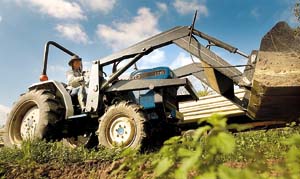In the mid-1980s Tonya Antle was a bright-eyed, twenty-something
working for a table-grape grower in Delano. But when she tried to
expand the company’s organic sales
– a division Antle helped create – she found herself blocked by
male produce brokers unwilling to take a chance on her.
Hollister – In the mid-1980s Tonya Antle was a bright-eyed, twenty-something working for a table-grape grower in Delano. But when she tried to expand the company’s organic sales – a division Antle helped create – she found herself blocked by male produce brokers unwilling to take a chance on her.
“I had two things going against me – I was a woman and I was trying to sell organics to them at a time most were not familiar with the concept,” said Antle. Twenty years later, Antle is the vice president of organic sales at Earth Bound Farms in San Juan Bautista, the largest grower of organic produce in North America.
Although the glass ceiling still exists, according to Antle and others, women are increasingly finding a place at the table when it comes to playing a vital role in agriculture. And where many were once relegated to behind-the-scenes jobs, such as finances, today they are driving tractors, negotiating million-dollar business contracts and running farms, without the help of husbands or other male partners.
The road hasn’t been easy for some, like Antle, who considers herself a trailblazer in an industry still largely dominated by men.
“We were unique and had to work harder to gain respect and recognition,” said Antle. “We were the ones who paved the way.”
When Kathy Taylor knocked on doors around San Benito County in the ’70s to educate residents about important agricultural issues, some looked at her quizzically. “‘What do you know about any of it?’ they’d say. ‘You are a woman’,” recalled her daughter, Abby Taylor.
Kathy Taylor was campaigning on behalf of California Women for Agriculture, an agricultural group started in 1974 by a group of women in the Coachella Valley. Today, there are 23 chapters all over the state totaling more than 3,000 members, who keep a close watch on how local senators and congressmen vote on agricultural issues.
Abby Taylor, now 26, has followed in her mother’s footsteps. After graduating from the University of California at Davis, where one of her majors was agricultural economics, she now works for the California Strawberry Commission, an organization formed by strawberry growers. She says women are gradually climbing the ranks of the agricultural industry and getting recognized for their work.
“You can see women in top jobs,” she said. “They are getting their voices heard and thoughts expressed.”
Today, more women are pursuing degrees in agricultural science, marketing and economics and entering professions usually reserved for men, said Earth Bound Farm’s Antle.
And while modern life has taken some women with deep roots in San Benito County’s agriculture into other sectors, many still find a way to stay close to the land. Celeste Settrini’s family moved to the Salinas Valley in the early 1920s from Switzerland, started a dairy farm and planted row crops. Four generations later, Settrini spends most days inside an office, but she hasn’t forgotten her family’s roots. After work, she returns to her family’s ranch home in Salinas and takes care of cattle, that also graze off Cienega Road in San Benito County. Every summer, she works alongside her brother and father to help deliver calves and brands them in the winter.
“You rarely find women out there working with cattle,” she said. “In the past, the girls have tended to go off and get married and the land was left to the men or sold.”
Settrini recalls spending her childhood taking care of animals and helping her father on the tractor – experiences that helped instill solid values that have molded her into who she is today. That is why she is proud to keep her connection to the land, especially in the face of pressure from numerous developers to sell the ranch.
Others, like Janet Brians, didn’t grow up on a ranch. In fact, living in Southern California and later the Bay Area, Brians had little connection to agriculture until she and her husband bought a farm off Shore Road over 30 years ago. Today, the 100-acre farm has 30 sheep, row crops such as greens, beats and tomatoes and over 1,000 trees, which Brians planted with her own two hands.
“The farm is my obligation and responsibility,” she said.
Brians, who has been a certified organic farmer in the county since 1976, has always had an urge for farming, even when she was living in the urban jungle of Los Angeles as a college student.
“It may well be genetic,” she said.
The women on her mother’s side, immigrants from Germany, were farmers in Illinois and her parents owned a farm there until they moved to California. Work, she said, was always divided evenly among men and women.
Family farms may have been ahead of others in gender equality. It took Antle until 1989, when a forward-thinking director of a Boston supermarket took a chance on her product and agreed to sell the table grapes at his store, to finally feel like she was being heard. That led to contracts with other stores and eventually to her job at Earth Bound Farms, which she started in 1998. Three years ago, Antle was appointed to the U.S. Department of Agriculture’s Advisory Board, which reviews policy and advises the Agricultural Secretary.
“The new generation is more tolerant of the fact that women have a place at the table,” said Antle. “We’ve done a good job of bringing women in … because more than anyone, women make the connection between what’s grown and what’s offered to the customer.”
Karina Ioffee covers education and agriculture for the Free Lance. Reach her at (831)637-5566 ext. 335 or ki*****@***********ws.com









